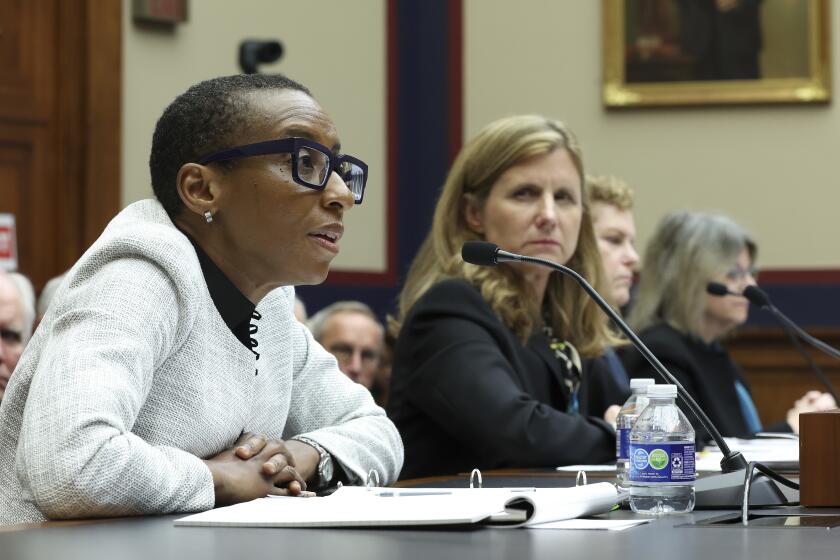Opinion: Reality check — intifada has nothing to do with genocide of Jews

- Share via
When New York Rep. Elise Stefanik repeatedly — and now infamously — badgered three college presidents about the nuances of free speech last week, she attempted to push her narrative that elite schools are antisemitic by equating “chants for intifada” with “genocide of Jews.”
The three presidents fell for the trap that a Palestinian uprising could be connected to crimes against humanity.
I was a journalist for Al Fajr, a Palestinian weekly, in the late 1980s, when the first intifada began. The word appeared on leaflets in the title of a Palestinian Liberation Organization-backed group: the Underground Unified National Leadership of the Intifada.
Harvard President Claudine Gay will remain as leader of the university despite a backlash over her remarks at a congressional hearing on antisemitism.
Dan Fisher, then the Jerusalem bureau chief for the Los Angeles Times, asked me to translate it. “Intifada” means “shaking off,” I told him, a reference to the demand for freedom from occupation. Palestinians opposed the occupation, not Israel. Palestinians’ aspirations were for an independent state alongside Israel, not instead of Israel.
Initially, the intifada included the methods of resistance practiced by Martin Luther King Jr., Mahatma Gandhi and Nelson Mandela. My cousin Mubarak Awad was deported by Israeli Prime Minister Yitzhak Shamir for crisscrossing the occupied Palestinian territories and distributing the Arabic translation of Harvard professor Gene Sharp’s writings on nonviolence. Mubarak advocated boycotts of Israeli products, work refusals and building up the Palestinian economy to prepare for independence.
Universities must keep students safe. But a broad new rule prohibiting ‘advocacy of genocide’ would not protect students and could be used against any group.
To equate the call for an end to the Israeli occupation with a call for the genocide of Jews is a bizarre reversal that turns victims into aggressors.
Six years of civil disobedience and protest brought about the Oslo Accords and the signing of the Declaration of Principles between Israel and the PLO on Sept. 13, 1993. On the eve of that important agreement, the PLO recognized Israel and Israel recognized the PLO as the representative of the Palestinian people. Unfortunately, that important event, sealed with a White House handshake between PLO Chairman Yasir Arafat and Israeli Prime Minister Yitzhak Rabin, was upended when a radical Israeli settler named Yigal Amir assassinated Rabin in 1995 as he was departing from a peace rally in Tel Aviv.
The courageous Rabin was succeeded by Benjamin Netanyahu in his first term as Israeli prime minister. Then as now, Netanyahu multiplied illegal settlements in the occupied Palestinian territories. Since Oslo, the number of Israeli settlers has quadrupled in the West Bank, the very territory that was supposed to be an independent Palestinian state alongside Israel.
Leaders at University of Pennsylvania, Harvard and MIT failed to show moral clarity and good sense with evasive answers regarding calls for the genocide of Jews.
As part of the Oslo Accords, Israel agreed to open a safe passage between Gaza and the West Bank. That passageway was opened in 1999 but lasted one year and has been closed since.
In the winter of 2000, Israeli prime minister candidate Ariel Sharon staged a deliberately provocative campaign visit to Al Aqsa Mosque. The Palestinian protests that followed were violently and fatally put down, and so began the second intifada, a recognition that negotiation and nonviolence had failed to end the occupation and create an independent Palestinian state.
Dan Fisher in 1988 was one of the first to make “intifada” a household word in America and the English-speaking world. The term has never meant genocide, and its target is not Jews but Israel’s illegal occupation — “the inadmissibility of the acquisition of land by war,” as U.N. Security Council Resolution 242, adopted in 1967, puts it.
In response to Stefanik’s congressional bluster, the three presidents of the University of Pennsylvania, Harvard and MIT should have stated clearly that genocide against Jews or any other people is unacceptable. They could have added that intifada is in no way equivalent to that heinous act.
Daoud Kuttab is a Palestinian journalist, a former professor of journalism at Princeton University and a columnist with Al-Monitor. X: @daoudkuttab Threads: @Daoud.Kuttab
More to Read
A cure for the common opinion
Get thought-provoking perspectives with our weekly newsletter.
You may occasionally receive promotional content from the Los Angeles Times.













